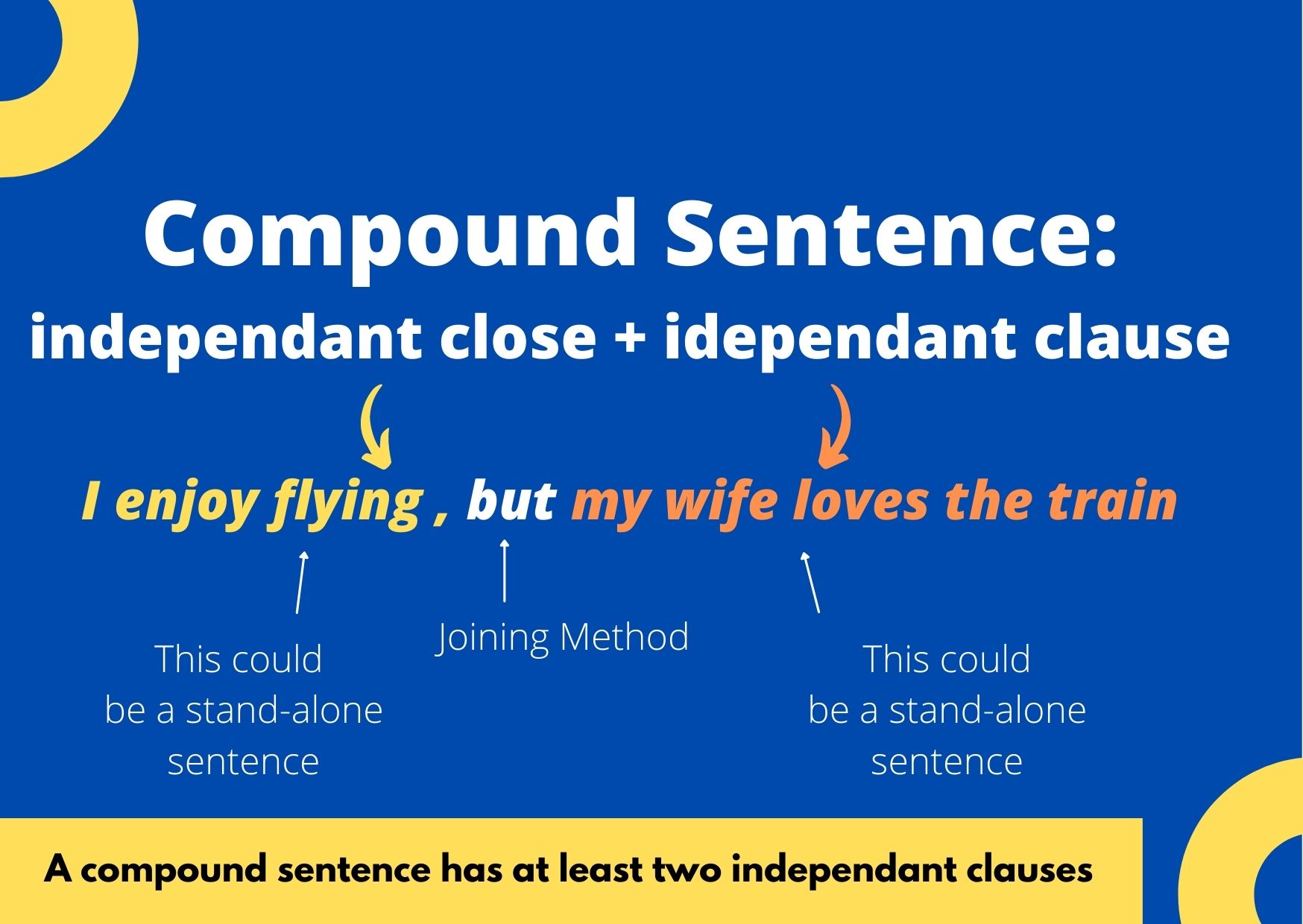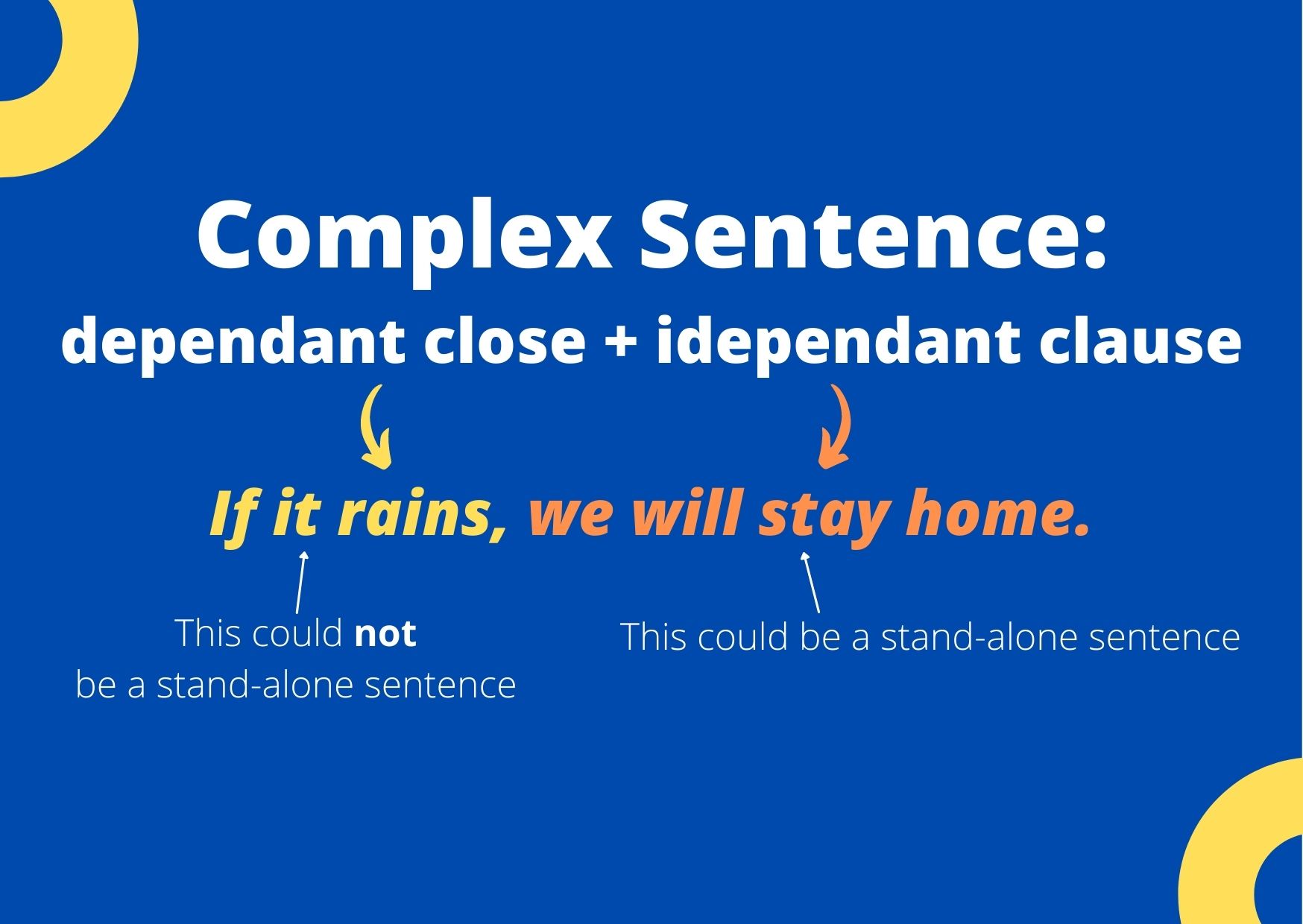Define Definition of a Compound Sentence
A compound sentence is one that connects two independent clauses, usually with a coordinating conjunction like but or and. They work best for combining two or more self-sufficient and related sentences into one single, unified sentence.
Compound sentences will give your writing a faster pace and join related ideas together, but they have a few more rules than a standard sentence. In this guide, we show you how to use them the correct way to give your writing an edge.
What is a compound sentence?
Compound sentences unite two or more independent clauses. The key word here is independent clauses, which are clauses that can stand alone as separate sentences. Basically, a compound sentence will bring together individual, related sentences as one.
(If you're unfamiliar with these terms, check out this guide to clauses in English , which better defines what makes up a clause.)
A compound sentence is easy to identify because they typically use a coordinating conjunction , which you may remember by using the acronym FANBOYS: For , And , Nor , But , Or , Yet , and So . Although, compound sentences can also utilize a semicolon to connect two clauses, in which case no conjunction is needed.

Let's take a look at some examples:
Compound sentence examples
These are two simple sentences. Both are independent clauses because they individually have their own subject and verb.
I have a pet rabbit. His name's Peter.
To merge them into a compound sentence, we just add a comma plus the coordinating conjunction of and .
I have a pet rabbit, and his name's Peter.
Alternately, we can make a compound sentence by only adding a semicolon and the sentence is still correct.
I have a pet rabbit; his name's Peter.
Even though they are talking about the same topic, the subjects of each sentence are not the same: the first sentence's subject is I and the second sentence's subject is name . That is part of what makes them independent, and compound sentences only work with independent clauses. For example, the following sentence is not a compound sentence.
I have a pet rabbit whose name is Peter .
To be a compound sentence, it needs to have at least two subjects and two verbs. If both sentences use the same subject, then it must be stated twice, as in this next example. If it isn't, it's not a compound sentence.
"You either die a hero, or you live long enough to see yourself become a villain . " —Batman- Batman Begins
Beware of sentences with two subjects or two verbs—these are not the same thing as compound sentences. This next sentence is not a compound sentence as there is only one subject and because what comes after the conjunction "and" isn't an independent clause:
I like to drink coffee and tea.
You can, however, turn this sentence into a compound sentence by adding another independent clause with a second subject:
I like to drink coffee and tea, but not hot chocolate.
Keep in mind that imperative sentences won't always show their subjects because they are assumed. That leads to compound sentences like this:
Get me some food, or I will starve!
Now let's take a look at some more compound sentence examples from some of history's greatest writers:
"I must get my soul back from you; I am killing my flesh without it." —Sylvia Plath
" It's not the size of the dog in the fight, it's the size of the fight in the dog " —Mark Twain
"I became insane, with long intervals of horrible sanity." ― Edgar Allan Poe
Commas and punctuation in compound sentences
When you're writing compound sentences, there are two punctuation rules to remember:
1 Be sure to place a comma before the coordinating conjunction.
2 If you are not using a coordinating conjunction, be sure to place a semicolon between each clause.
Always use a lowercase letter to begin the second independent clause. Because compound sentences are a single sentence, only the first letter of the first clause is capitalized.
Mastering these punctuation rules is critical for creating compound sentences. Without them, your sentence becomes a shudder inducing run-on sentence . In writing, run-on sentences are not only incorrect grammatically , but also they also make it difficult for your readers to understand.
To avoid run-on sentences and confusingly long compound sentences, try to curb the amount of clauses to two or three. In a situation when you need more than three clauses, keep them as short as you can by removing unnecessary words. Remember, short sentences are easier to read and give your writing a faster pace.
Compound verses complex sentences
It is easy to get compound sentences mixed up with complex sentences; both use two or more clauses in a single sentence. The most notable difference, however, is the type of clause they use.
A compound sentences uses two or more independent clauses.
I'm working now, but we will catch up later.
Complex sentences blend independent clauses with subordinate clauses , which are also known as dependent clauses.
Related: Complex Sentence – What is it?

Here is an example:
Because I'm working now, we will catch up later.
In this sentence, because I'm working now is the subordinate clause and we will catch up later is the independent clause. The key is the word because , which is a subordinating conjunction . Words like if, whenever , because, and since —as well as some prepositions like after and before —all act as subordinating conjunctions. Their job is to join subordinate clauses to independent clauses.
Simply by adding a subordinating conjunction, you can turn an independent clause into a subordinating clause. I'm working now alone is an independent clause, but with because in front it becomes a subordinating clause.
Be careful, however, because a sentence can be both complex and compound at the same time! A complex-compound sentence occurs when one single sentence has at least two independent clauses and at least one subordinate clause.
After I got home, my mom invited me to dinner, and I left home again.
In this sentence, after I got home is the subordinate clause (you can tell because the word after appears in front). Both my mom invited me to dinner and I left home again are independent clauses, combined by the coordinating conjunction and . Put all three clauses together with the correct punctuation and you have a grammatically correct complex-compound sentence.
Refine your writing
The rules about different clauses and how you unite them can get complicated, even for native English speakers. It takes practice to get used to, especially getting to know all the different coordinating and subordinating conjunctions.
If you're feeling unsure about your English, you can always use a writing assistant program. Writing suggestions will point out any grammar mistakes you may have missed, including run-on sentences and missing commas before conjunctions. This help will ensure your writing is clear to your readers.
Want to sharpen your business writing skills? Discover our acclaimed online courses at syntaxtraining.com. Whether you want to learn about taking taking meeting notes, become a master proofreader, master punctuation or tune-up your business writing skills, our courses are here to help you.
Define Definition of a Compound Sentence
Source: https://www.businesswritingblog.com/business_writing/2021/10/whats-a-compound-sentence.html